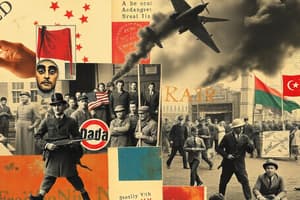Podcast
Questions and Answers
What does the acronym M.A.N.I.A. stand for in the context of WWI?
What does the acronym M.A.N.I.A. stand for in the context of WWI?
- Militarism
- Alliances
- Nationalism
- All of the above (correct)
What was Militarism?
What was Militarism?
The policy of building up a strong military to prepare for war.
What were the two major alliances during WWI?
What were the two major alliances during WWI?
Triple Entente and Triple Alliance.
What is Nationalism?
What is Nationalism?
Define Imperialism in the context of WWI.
Define Imperialism in the context of WWI.
What does Assassination refer to in the context of WWI?
What does Assassination refer to in the context of WWI?
Flashcards are hidden until you start studying
Study Notes
M.A.N.I.A. - Causes of WWI
- Acronym M.A.N.I.A. represents the primary causes of World War I: Militarism, Alliances, Nationalism, Imperialism, and Assassination.
- Each cause contributed significantly to the onset of the war.
Militarism
- Militarism involved a significant build-up of military forces, fostering an arms race among nations.
- Countries aimed to strengthen their armed forces for defense and national interests, leading to increased tensions.
Alliances
- Alliances entailed agreements between nations for mutual support during conflicts.
- Major alliances included the Triple Entente (Allies) with Great Britain, France, and Russia, and the Triple Alliance (Central Powers) with Germany, Austria-Hungary, and Italy.
- The formation of these alliances heightened suspicions and conflict readiness among countries.
Nationalism
- Nationalism is characterized by intense pride in one’s nation, often accompanying symbols like flags and anthems.
- The influence of the French Revolution spread nationalist sentiments across Europe.
- Ethnic groups sought independence, fueling conflict with imperial powers and increasing national rivalries.
Imperialism
- Imperialism refers to the domination of one country over another politically, economically, or culturally.
- Driven by the Industrial Revolution, nations like Great Britain, Germany, and France pursued foreign markets for natural resources, intensifying global competition and colonial conflicts.
Assassination
- Assassination is the intentional killing of a prominent official to influence political events.
- The assassination of Austrian Archduke Franz Ferdinand and his wife by the Serbian nationalist group, the Black Hand, on June 28, 1914, is viewed as the immediate trigger for WWI.
- The belief that Bosnia should belong to Serbia fueled the nationalist sentiments and led to a declared expansion of conflict.
Studying That Suits You
Use AI to generate personalized quizzes and flashcards to suit your learning preferences.




